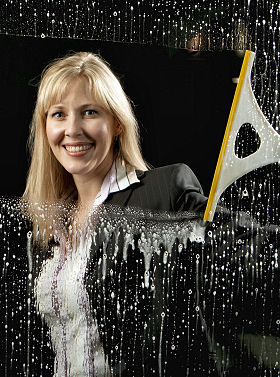26 October 2009
Cleanliness next to goodliness
by Kate Melville

Experiments involving fairness and generosity showed that people in rooms which had been freshly scented with a cleaning product exhibited a dramatic improvement in ethical behavior. The findings could have significant implications for workplaces and retail environments, notes study leader Katie Liljenquist (pictured), from Brigham Young University.
The study, appearing in Psychological Science, monitored participants engaged in several simple tasks, the only difference being that some worked in unscented rooms, while others worked in rooms freshly spritzed with citrus-scented Windex.
"People are unconsciously fairer and more generous when they are in clean-smelling environments," said Liljenquist. "Companies often employ heavy-handed interventions to regulate conduct, but they can be costly or oppressive. This is a very simple, unobtrusive way to promote ethical behavior."
In the first experiment, evaluating fairness, participants played a classic psychological trust game. Subjects received $12 of real money (allegedly sent by an anonymous partner in another room). They then had to decide how much of it to either keep or return to their partners who had trusted them to divide it fairly. Subjects in clean-scented rooms were less likely to exploit the trust of their partners, returning a significantly higher share of the money. The average amount of cash given back by the people in the "normal" room was $2.81. But the people in the clean-scented room gave back an average of $5.33.
The second experiment, evaluating whether clean scents would encourage charitable behavior, involved the subjects indicating their interest in volunteering for a charity project and donating funds. The participants surveyed in the Windexed room were significantly more interested in volunteering (4.21 on a 7-point scale) than those in a normal room (3.29). Additionally, 22 percent of Windex-ed room participants said they'd like to donate money, compared to only 6 percent of those in a normal room.
"Basically, our study shows that morality and cleanliness can go hand-in-hand," said co-reseracher Adam Galinsky, of the Kellogg School. "Researchers have known for years that scents play an active role in reviving positive or negative experiences. Now, our research can offer more insight into the links between people's charitable actions and their surroundings."
Related:
Tweet this: Rapid-fire media confuses our moral compass
Monkeys Pay One Another For Work
Re. Ethics
Source: Brigham Young University
